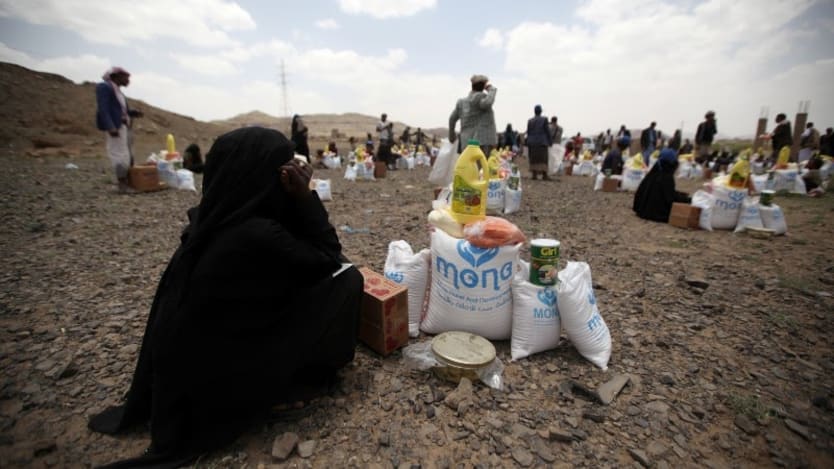
The United Kingdom has slashed humanitarian funding to Yemen — considered the world’s worst humanitarian crisis — by nearly 60%.
In the first brutal revelation of how Britain’s aid budget will be affected by dropping funding from 0.7% of gross national income to 0.5%, Foreign, Commonwealth & Development Office Minister James Cleverly told a conference Monday afternoon that the U.K. will be donating just £87 million ($120 million) to Yemen relief efforts in the coming year. That’s less than half of the £196.6 million the U.K. donated at a Yemen pledging event in 2020 and around 40% of the £214 million total in U.K. donations to Yemen in 2020-2021.
The vastly reduced amount comes despite FCDO’s classification of humanitarian need as a priority area that would be given protection from its spending cuts. “Famine is bearing down on Yemen,” according to United Nations Secretary-General António Guterres, who said 20 million of the country’s people were in need of humanitarian assistance and protection.
“With so many people on the edge of famine, there is no avoiding the fact that this decision will cost lives,” tweeted Elizabeth Sugg, who resigned from her position in the government over the aid cuts.
“Millions of Yemeni children, women and men desperately need aid to live. Cutting aid is a death sentence.”
— António Guterres, secretary-general, United NationsIt reflected a poor showing from donors across the board, with the conference raising just $1.67 billion from 36 donors — far short of the $4 billion the U.N. said was needed.
Rights groups expressed disappointment at donor countries Monday after the conference.
“I told governments at the conference that I have just seen children who are already dying of starvation in Yemen,” said Jan Egeland, secretary-general at the Norwegian Refugee Council, in a statement. “It is in their power to prevent full-scale famine, or forever have this stain on their consciences. So far, they have failed to act.”
“Millions of Yemeni children, women and men desperately need aid to live,” Guterres said in a statement. “Cutting aid is a death sentence.”
The United Kingdom’s decision was met with shock by development advocates. Laurie Lee, chief executive at CARE International UK, described it as “devastating.”
“The U.N. has warned everybody that Yemen is on the brink of famine, and the U.K. government’s statement [at the summit] acknowledged that was true,” he told Devex. “Then it said it would cut in half the number of people that it gives lifesaving food to each month.”
Kevin Watkins, chief executive at Save the Children UK, wrote: “In September last year, the UK announced a global Call to Action to avert famine. Six months later, they slash aid to a country on the verge of the largest famine the world has seen in decades.
“Global Britain should be standing up for the 400,000 children under five who might starve to death in Yemen this year, not withdrawing support when they need it most.”
Watkins called on the government to “urgently rethink this move and the plan to abandon the 0.7% commitment.”
Despite a manifesto commitment to spend 0.7% of national income on aid, Chancellor Rishi Sunak announced in November the government would reduce spending to 0.5%. The government also promised to bring new development legislation to allow it, but this has not yet happened.
UK government rejects aid cut information request 'for commercial reasons'
An NGO's freedom of information request about last year's aid cuts has been denied by government officials.
The consequent decision to cut aid to Yemen drew condemnation from across the political spectrum, as members of Parliament called for a vote on the aid cut. Former Foreign Secretary Jeremy Hunt said it was “deeply disappointing” and “feels like an inevitable consequence of the flawed decision to step away from the 0.7% commitment. … We should be increasing the scale of our support in the face of such suffering; to cut it at this moment of extreme peril is incomprehensible.”
Sarah Champion, chair of the International Development Committee of aid-watching MPs, said it was “utterly appalling.” She wrote: “It sends a message that the UK is turning its back on the world’s worst humanitarian crisis. This is completely at odds with the Government’s assertions that the UK should be a global leader, especially in the year with the G7 [group of countries] and COP [Conference of the Parties] presidencies.”
Andrew Mitchell, former secretary of state for international development, described the decision as “unimaginable” and said it would “condemn hundreds of thousands of children to starvation” and made “no foreign policy sense at all.” Mitchell is believed to be organizing a parliamentary rebellion against any future legislation to allow the aid spending target to drop to 0.5% of GNI.
Lee added that the decision also raised questions about how the aid cuts were decided. The government has been criticized for a lack of transparency during the process, meaning NGOs have been left in the dark about the effects that programs on the ground would suffer.
Update, March 1, 2021: This article has been updated with details of the total funding from the conference and additional statements from NRC and António Guterres.








